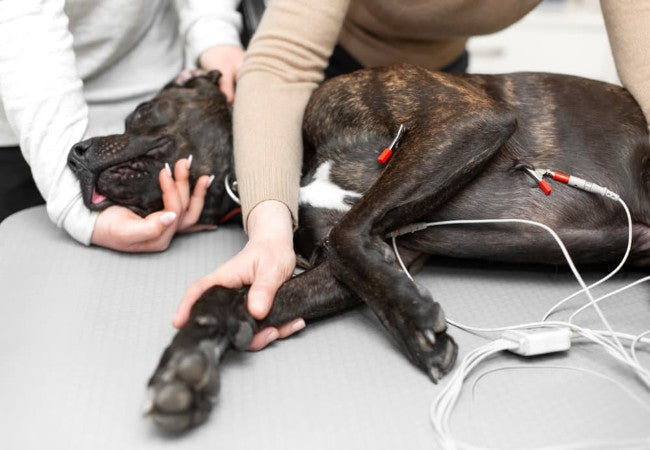Heart Attacks in Dogs Vet’s 2025 Guide– Recognition & Emergency Care 💔

In this article
Heart Attacks in Dogs Vet’s 2025 Guide– Recognition & Emergency Care 💔
By Dr. Duncan Houston BVSc
💡 What Is a Heart Attack in Dogs?
A heart attack—also called myocardial infarction—occurs when blood flow to the heart muscle is blocked, causing tissue damage or death. While rare in dogs, it's a serious emergency when it happens.
⚠️ Who's at Risk?
- Dogs with pre-existing heart disease, congenital defects, vascular conditions or tumors affecting coronary vessels.
- Obesity, diabetes, high-cholesterol diets, atherosclerosis, hypertension, vasculitis increase risk.
- Any breed, age, or size—though more common in older or unhealthy dogs.
🚨 Warning Signs to Watch
- Sudden collapse—often the first sign
- Rapid or labored breathing, panting, fast heart rate, fever
- Vomiting, front-leg pain, immobility, confusion, seizure, head tilt
- Sudden death may occur in severe cases
🔬 Diagnosis Approach
- Emergency physical exam: pulse, rhythm, breathing, blood pressure
- ECG for arrhythmias, cardiac markers, CBC, chemistry, and troponin as available
- Chest X-rays, echocardiogram, and potentially CT for detailed diagnosis and clot evaluation
🛠 Emergency Treatment
- Stabilize breathing and circulation—oxygen, IV fluids, pain control
- Anti-thrombotics (aspirin, clopidogrel) if clot is suspected
- Treat underlying conditions—manage arrhythmias, infections, and hypertension
- Advanced care may involve ICU monitoring, ventilatory support
🏥 Post-Event Care & Monitoring
- Hospital stay for observation—repeat ECGs, blood pressure, imaging
- Medications: heart failure drugs, antithrombotic regimens, treat comorbidities
- Cardiac rehabilitation—rest, stress reduction, nutritional guidelines
🛡 Long-Term Prevention
- Regular cardiac check-ups for at-risk dogs (equine echo, BP monitoring)
- Weight control, exercise, low-fat, balanced diet
- Manage diabetes, treat high blood pressure, and prevent infection-induced vasculitis
- Atherosclerosis/hyperlipidemia: diet, medication, regular screening for Schnauzers, Beagles, Bulldogs
📈 Prognosis
Prognosis is guarded. Survival depends on infarct size, speed of treatment, and effective management of underlying causes. Dogs that stabilize can survive months to years with close follow-up.
📲 Tools for Support
- Ask A Vet: 24/7 telehealth for emergencies, medication queries, and monitoring
✅ Key Takeaways
- Heart attacks in dogs are rare but life-threatening; rapid response is critical.
- Signs often include collapse, panting, vomiting, and arrhythmia symptoms.
- Diagnosis by ECG, imaging & bloodwork; treatment focused on stabilization & disease management.
- Prevention includes heart health monitoring, weight management & treating comorbidities.
- Post-event, supportive tools and veterinary follow-up improve survival chances 🩺
📥 Need Help Now?
If your dog collapses or shows breathing trouble, call your vet immediately. For real-time support, download the Ask A Vet app and visit AskAVet.com anytime for expert guidance. 💔🐾






